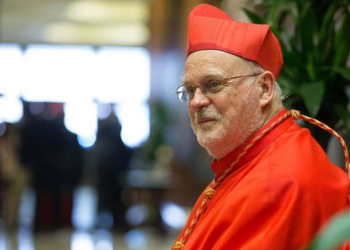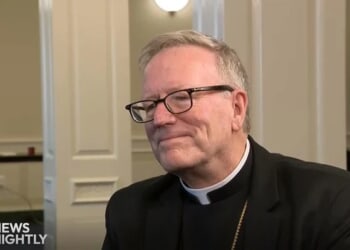In his Democracy in America, Tocqueville writes:
The inexperience of many of the European nations in the enjoyment of liberty leads them only to look upon the liberty of association as a right of attacking the Government.
The great Frenchman wrote from experience. He saw how political associations fought each other in the French revolution, with deadly consequences to the loser. The winners of centralized revolutionary power warred against other organizations that had strong claims on people’s allegiance as well, such as the Freemasons and Catholic religious orders, and the larger Church as well. Napoleon would end the banning of the Church, but he exacted a price by requiring the Church to make itself an adjunct of his political control. Here is an example of the Napoleonic catechism the French church adopted under his severe pressure in 1806:
Question: What are the duties of Christians toward those who govern them, and what in particular are our duties towards Napoleon I, our emperor?
Answer: Christians owe to the princes who govern them, and we in particular owe to Napoleon I, our emperor, love, respect, obedience, fidelity, military service, and the taxes levied for the preservation and defense of the empire and of his throne. We also owe him fervent prayers for his safety and for the spiritual and temporal prosperity of the state … To honor and serve our emperor is … to honor and serve God himself.
Napoleon similarly required a formal statement of subservience from French Jews, pressuring them as well into a formal and binding acceptance of the supremacy of the state in all matters that Napoleon were his alone to rule.
The aversion of twentieth century totalitarians to associations went much further. They would allow nothing to claim allegiance aside from the state and its despotic leader.
Instead of that vision … we find on the left only an arbitrary imposition of a brittle and largely incoherent hierarchy of permanent victimhood.
The early years of Lenin’s rule featured an attack on the basic association of marriage as something set on the road to dissolution, with all housework being done in common. The goal was no special economic relationship, no special loyalty to anything less than the omnivorous Whole. Allegiance to family distracted and subtracted from that.
Stalin’s regime promoted the legend of Pavel Morotsov, claiming that this boy informed on his parents to the police for their disloyalty to the working class. Then the reactionary parents killed Pavel, went the legend, and Stalin’s regime celebrated him as a Communist martyr. The jealous Communist state could not tolerate other human loyalties.
Not just Stalin. Committed leftists in Israel’s kibbutz movement set up some communities in which everyone had to eat in the communal dining room and child care was done almost exclusively by the group, intentionally weakening the family unit. Any form of group identity other than that to the governing unit at the top was to be reduced or eliminated.
This centralizing trend has been evident in history. From the Roman Caesars through the Sun King, through Napoleon, and then the Nazis and the Communists, many have felt that power is greatest when concentrated at the top. And that certainly makes sense if all one worries about is power.
Think of the democracies during World War II, when all was devoted to projecting the power needed to win: Churchill called Britain’s wartime government policy War Socialism; in America, prices were controlled and commodities rationed, gasoline in particular. Basic individual liberties were sometimes systematically denied: in California in particular, American citizens were rounded up into internment camps due to their ethnicity.
But constitutional governments aim to shed emergency powers as soon as possible. As Churchill wrote, civilization is characterized by the ascendancy of civil life over military organization. Larry Arnn summarized Churchill’s view:
Civilization, like government, is an activity, a form of community. It begins with the rule of law under the control of civilians. It proceeds to its first goal, the safeguarding of people in their homes and with their families, living fully human lives in care of themselves and others, participating in the common rule of all.
Advocates of centralized government want streamlining and concentration of power. Civilization pushes in the other direction — power is meant to safeguard the people, not to aggrandize the powerful. All are meant to participate in ruling.
That explains what Tocqueville saw and admired: the wide profusion of associations in constitutional America and their crucial importance for the constitutional republic:
The right of association was imported from England, and it has always existed in America; so that the exercise of this privilege is now amalgamated with the manners and customs of the people. At the present time the liberty of association has become a necessary guarantee against the tyranny of the majority.
The tyranny of the majority was a fundamental flaw of earlier democracies, and one that the Framers of the Constitution were determined to address. In The Federalist, Madison identifies the issue:
It is of great importance in a republic not only to guard the society against the oppression of its rulers, but to guard one part of the society against the injustice of the other part. Different interests necessarily exist in different classes of citizens. If a majority be united by a common interest, the rights of the minority will be insecure.
So, instead of seeking concentration of power, the Constitution seeks the wide distribution of power. And that gives liberty to all kinds of groups and associations.
But this raises a question. In this openness to smaller circles of association, how are the empowering ideas of the Constitution distinguished from the chilling onslaught of intersectionalism and the metastasized DEI bureaucracies? Even though those bureaucracies have been counterattacked and are losing their death grip on our society, it is important to understand why they continue to be so toxic.
After all, the language of DEI seems to be more of what Tocqueville was talking about. As well, DEI opponents, criticizing what they deem to be a resurgence of tribalism, seem not to get the idea that democracy thrives on subsidiary allegiances, as the widest distribution of power is where the Constitution starts: “We the People.”
The distinction is this: intersectionality is not an embrace but rather a rejection of natural diversity.
Natural diversity is something we humans have put at the center of our consciousness for a long time. Millennia ago, this idea appears in a beautiful form in the Bible.
Psalm 104 is a moving and loving song to the overflowing of blessing manifest in every aspect of nature. Verse 24 epitomizes this hymn: “How manifold are your works, Lord; You have made them all in wisdom; the earth is filled with your possessions.” What is absolutely clear here is that the abundant diversity of the natural world testifies to the magnanimity of God’s power. The oneness of God encompasses all things even as it exceeds them, granting its coherence — wisdom — in a way that we can see and feel and model in our own use of power and appreciation of difference.
Intersectionality, however, speaks of a reduction of every human story to a conflict of power. There is no all-encompassing meaning in the intersectional mindset, no appreciation of a what Psalm 104 shows: a generous oneness that shares its very being with even the smallest part of the world, its power always precisely congruent with its self-limiting generosity, goodness, and beauty.
Instead of that vision, which has inspired human life for so long, we find on the left only an arbitrary imposition of a brittle and largely incoherent hierarchy of permanent victimhood, in which power is assigned only according to the position in the hierarchy of a person’s group identity. It is a system divorced from the possibility of positive change, of redemption, of what is called in Hebrew teshuva, the return from our distorted sense of self to the self that is both gifted and known by God.
There is no escape from this hell of human construction. Associations of race and sex, unalterable by human choice, define the level of the inferno to which a person is consigned. Only through the choice of self-mutilation, ending the possibility of procreation, can one find a sterile imaginary redemption. We are only beginning to reckon with the astonishing harm we have done in accepting this system down to this hideous mode of redemption.
In the Nineties, Wendell Berry was already pointing out the shallow and unhelpful nature of the pluralism that was already usurping the place of the whole and natural vision of Psalm 104. Though not yet the full-blown malignancy of the intersectionalist tyranny that was to come, it was already transmuting into a cancerous aping of the real health of the divine natural diversity. Berry’s precise criticism of that kind of pluralism is that it “does not foresee or advocate a plurality of settled communities but is only an indifferent charity towards a plurality of aggrieved groups and individuals.
“Settled communities” is the goal, the only one that can bind people together of their own consent and deserve their sustaining affection. Short of that, we have only affectation, a poisonous extravagance, a spiritual wormwood.
At the core of it all is the Supreme principle, capable of integrating law and love, manifest in nature, dwelling within every level of association that we find and develop in our constitutional republic — spiritual, artistic, political, and economic. Around that supreme allegiances we build our world of loving associations, and a land that we love, that welcomes them all.
May our devotion only increase. In lives lived in love’s necessary particularity, we can find that which is strong enough and deep enough to unite us all.
READ MORE from Shmuel Klatzkin:
The Stark Differences Between Democracy and Tyranny



![Steak ’n Shake Mocks Cracker Barrel Over Identity-Erasing Rebrand [WATCH]](https://www.right2024.com/wp-content/uploads/2025/08/Steak-n-Shake-Mocks-Cracker-Barrel-Over-Identity-Erasing-Rebrand-WATCH-350x250.jpg)

![Human Trafficking Expert Details Horrific Biden Admin Endangerment of Migrant Kids [WATCH]](https://www.right2024.com/wp-content/uploads/2025/07/Human-Trafficking-Expert-Details-Horrific-Biden-Admin-Endangerment-of-Migrant-350x250.jpg)


![Soros Network, Others Behind LA Riots [WATCH]](https://www.right2024.com/wp-content/uploads/2025/06/Soros-Network-Others-Behind-LA-Riots-WATCH-350x250.jpg)
![Mount Rushmore Could Get Trump Upgrade Under GOP Push [WATCH]](https://www.right2024.com/wp-content/uploads/2025/07/Mount-Rushmore-Could-Get-Trump-Upgrade-Under-GOP-Push-WATCH-350x250.jpg)





